|
G'Day Gonna:
The term "cane" comes from glass bead makers.
http://en.wikipedia.org/wiki/Glass_beadmaking
Glass bead makers would take colored rods of glass and layer them.
They'd make flowers and other designs with these rods of glass. When
it was heated two workers would pull that "cane" and make it longer,
narrower. Then they would slice off little disks that had that design.
The earliest example of this that I've found is an Ancient Egyptian
Ibis, done a gazillion years ago.
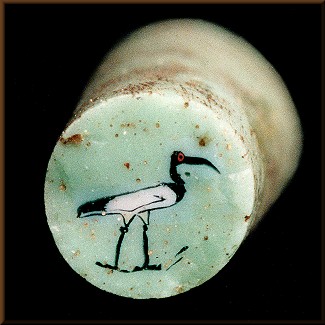
http://www.touregypt.net/science.htm
"Art of Glass Making
This art is of very ancient origin with the Egyptians, as is evident
from the glass jars, figures and ornaments discovered in the tombs.
The paintings on the tombs have been interpreted as descriptive of the
process of glass blowing. These illustrations representing smiths
blowing their fires by means of reeds tipped with clay. Therefore it
can be concluded that glass-blowing is apparently of Egyptian origin.
The remains of glass furnaces discovered by Flinders-Petrie at
Tel-El-Amarna (1400 B.C.) illustrate the manufacture of rods, beads,
and jars or other figures, formed apparently by covering clay cores
with glass and later removing the cores.
Egyptian glass articles were of colored glass, often beautifully
patterned. Analyses of ancient Egyptian glass articles show that
generally glass was a soda-lime glass with rather soda content as
compared with modern soda-lime glass. "
Millefiori, the term used with Polymer Clay means "Thousand Flowers"
in Italian, a technique used for beads where these little disks would
be applied to a glass bead and then reheated so they would melt onto
the glass bead.
http://www.museum.state.il.us/exhibits/barker/techniques/tech_millefiori.php
During the African Slave Trade days 16 million tons of beads were
funneled into Africa to buy people and raw resources.
http://www.bakervalley.com/bead.htm
That's what made Venice, Italy
rich back in the 16th Century.
http://www.beadshows.com/ibs/articles/venetianbeads.html
That's also why I wince at the term "canes" used with Polymer Clay.
But enough of ancient history and glass beads. What are we using canes
for here with Polymer Clay?
Think jelly roll cake, or Sushi if you will. It's the same sort of
thing.
Everything in the world, when reduced to a two dimensional picture,
can be broken up into dots, lines, and/or a gradation of color. When making a cane that
dot is a snake of clay and the line is a sheet of clay. A gradation of color
is a blend.
We want that two
dimensional picture to be a log that we will slice and do things to the slices.
Snakes, sheets and blends. It's that easy to "raise cane".
How Polymer Clay and Glass are similar is how we can start out with a
large log of design and pull it to make the design smaller. That's the
only similarity. That's why I'd love to have another term coined for
this technique.
Below are some links to tutorials of different types of canes, for a
number of uses. Why not tell us what you're wanting to make? Then we
can narrow down the focus for the tutorial that might help you.
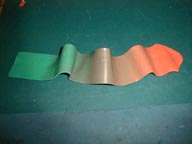 Biz-Archive/Blend-Grp.htm Biz-Archive/Blend-Grp.htm
Canes made with blends add depth and variety to your finished items.
Animal Cane Review: 06-11-04
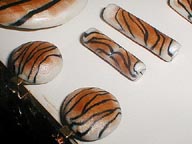
FireCane
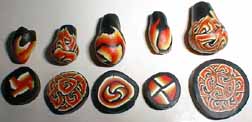
FlowersLeaves/Index.htm
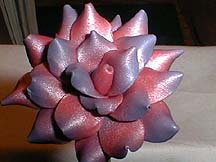
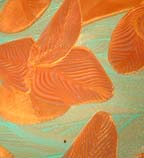 Once you get canes made you can press them on to sheets of clay Once you get canes made you can press them on to sheets of clay
Biz-Archive/Sheets/Group-thm.htm
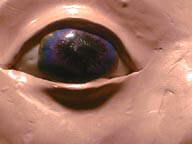 You can use cane for eyeballs for your figures You can use cane for eyeballs for your figures
../Biz-Archive/Sculpt/Eyeball/Index.htm
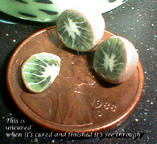
Or for mini food
Biz-Archive/food/Diner-FruitNvegs
Since we are miniaturists as well as artists who use polymer clay we
tend to be focused on using canes for three dimensional flowers and
leaves, for eyeball iris, for shading on skin for our figures, for
clay sheets that act as clothing for our figures, for mini food and
even Ice for our pitcher of Lemonade. The colors used for mini food,
flowers and leaves are determined by nature for as miniaturists we are
dedicated to simulating nature, but on a smaller scale.
Biz-Archive/food/2-02-lunch group
I love this lunch
group too much.
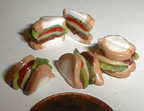
I tell you true, melted cheddar cheese was the hardest color mix I
ever ran across. I made some cheeseburgers and fries back in late 2000
and I STILL have some of the melted cheddar cheese mix left over.
Biz-Archive/food/Cheeseburger Group
Canes made the tomato slices, pickles, purple onion, lettuce and
cooked meat patty.
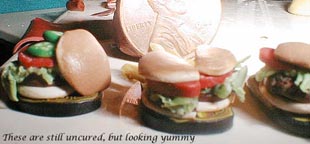
I've been layering a thin slice of that melted cheddar cheese mix over
mini bread to give it that toasty effect. White bread is done as a
jellyroll blend. Doing a blend of light brown to white, roll the
resulting blend like a jelly roll, form like a baked loaf, then layer
that melted cheddar cheese mix on top and smear down the sides and
slice for sandwiches.
Biz-Archive/food/PBandJ/Bread-grp.htm
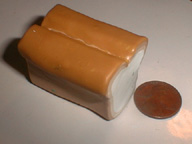
As miniaturists we are experimenting with using Translucent Liquid
Sculpey to give sauces and dressings and frosting and glaze to our
mini food. This is in addition to doing canes.
Biz-Archive/food/TLSastries/Group-TLSastriesThms.htm
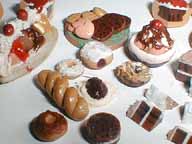
So canes are a means to an end and not the end in itself to me. It's
part of the bag of tricks that we can use when making Mini Scenes...
and things. LOL
Welcome to the list. (Demo information edtied out because Demos are retired)
02/12/08.
xoxo
NoraJean
Owner of CITY-o-Clay
|
